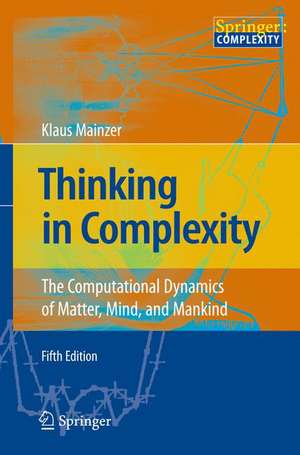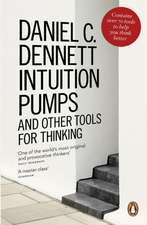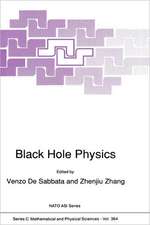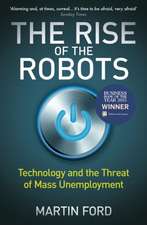Thinking in Complexity: The Computational Dynamics of Matter, Mind, and Mankind
Autor Klaus Mainzeren Limba Engleză Hardback – 10 sep 2007
From the reviews of the fourth edition:
"… this highly recommended book is a wonderful resource for intuitive basic ideas in the need of rigorous formulation." (Albert A. Mullin, Zentralblatt MATH)
| Toate formatele și edițiile | Preț | Express |
|---|---|---|
| Paperback (1) | 371.18 lei 22-36 zile | |
| Springer Berlin, Heidelberg – 30 oct 2014 | 371.18 lei 22-36 zile | |
| Hardback (1) | 378.50 lei 22-36 zile | |
| Springer Berlin, Heidelberg – 10 sep 2007 | 378.50 lei 22-36 zile |
Preț: 378.50 lei
Nou
Puncte Express: 568
Preț estimativ în valută:
72.45€ • 78.72$ • 60.90£
72.45€ • 78.72$ • 60.90£
Carte disponibilă
Livrare economică 31 martie-14 aprilie
Preluare comenzi: 021 569.72.76
Specificații
ISBN-13: 9783540722274
ISBN-10: 3540722270
Pagini: 504
Ilustrații: XVIII, 482 p.
Dimensiuni: 155 x 235 x 35 mm
Greutate: 0.92 kg
Ediția:5th rev. and enlarged ed. 2007
Editura: Springer Berlin, Heidelberg
Colecția Springer
Locul publicării:Berlin, Heidelberg, Germany
ISBN-10: 3540722270
Pagini: 504
Ilustrații: XVIII, 482 p.
Dimensiuni: 155 x 235 x 35 mm
Greutate: 0.92 kg
Ediția:5th rev. and enlarged ed. 2007
Editura: Springer Berlin, Heidelberg
Colecția Springer
Locul publicării:Berlin, Heidelberg, Germany
Public țintă
Popular/generalCuprins
Introduction: From Linear to Nonlinear Thinking.- Complex Systems and the Evolution of Matter.- Complex Systems and the Evolution of Life.- Complex Systems and the Evolution of Mind–Brain.- Complex Systems and the Evolution of Computability.- Complex Systems and the Evolution of Artificial Life and Intelligence.- Complex Systems and the Evolution of Economies.- Complex Systems and the Evolution of Human Culture and Society.- Epilogue on Future, Science, and Ethics.
Recenzii
From the reviews of the fourth edition:
THE INDUSTRIAL PHYSICIST:
"The science of complexity is likely to be among the most salient features of the 21st century, and Thinking in Complexity: Computational Dynamics of Matter, Mind, and Mankind is just as likely to be among the most popular introductions to the topic. Author Klaus Mainzer treats highly technical materials related to descriptions of complexity pervading science, engineering, and societal dynamics–and even ethics–with a lucidity that is sure to captivate physicists as well as the general public with a moderate scientific background. … Readers of this book will enjoy Mainzer’s exposition, which is based on a tight coupling between classical and historical concepts from Plato and Aristotle to modern, mathematical and physical developments, including relativity, chaos, and quantum physics. Every chapter begins with a section designed to orient the reader to the perspective of philosophical developments through the ages pertinent to the topic at hand. Readers patient enough to read through the lines will be rewarded with occasional gems such as Mainzer’s speculation on a possible correlation between a society’s development of atomistic ideas and its possession of a phonetic alphabet. The author takes pains to point out essential differences between classical science and the science of complexity. … Thinking in Complexity is an outstandingly readable book."
"This book is ambitious, incredibly erudite wih 22 pages of references, and is indisputably clearly and beautifully illustrated. It is perfectly suited to a first course on the science of complexity." (Physicalia 2005, vol. 57, page 191-192)
"All-in-all, this highly recommended book is a wonderful resource for intuitive basic ideas in the need of rigorous formulation." (Albert A. Mullin, Zentralblatt MATH 2004, vol. 1046, page 5)
"‘This is thefourth revised and slightly enlarged edition’ of what has been a bestseller since its first publication in 1994. … This book is ambitious, incredibly erudite with 22 pages of references, and is indisputably clearly and beautifully written and illustrated. It is perfectly suited to a first course on the science of complexity. Even beginners and young graduate students will have something to learn from this book." (André Hautot, Physicalia, Vol. 57 (3), 2005)
"Here is the fourth edition of a highly successful sequence of editions of this excellent book on complexity theory and its implications. … The major change from the three earlier editions is a shift of emphasis from the complex dynamics of matter, mind, and mankind towards the computational dynamics of mind, matter and mankind. … 100 pages of useful new material have been added to the book. All-in-all, this highly recommended book is a wonderful resource for intuitive basic ideas in the need of rigorous formulation." (Albert A. Mullin, Zentralblatt MATH, Vol. 1046 (21), 2004)
"Readers of this book will enjoy Mainzer’s exposition, which is based on a tight coupling between classical and historical concepts from Plato and Aristotle to modern, mathematical and physical developments … . Every chapter begins with a section designed to orient the reader to the perspective of philosophical developments through the ages pertinent to the topic at hand. … The author takes pains to point out essential differences between classical science and the science of complexity. … Thinking in Complexity is an outstandingly readable book." (Anutosh Moitra, The Industrial Physicist, August/September, 2004)
From the reviews of the fifth edition:
"A new fifth edition of ‘Thinking in Complexity’ reflects recent developments associated with complexity research in life and physical sciences, computer science, economics, social and cognitive sciences. … This valuable text on complexitytheory and nonlinear dynamics features profound applications to important problems in natural and social sciences, culture, economics and serves both as a gentle introduction to complexity and a versatile encyclopedia where recent contributions to the field are thoroughly collected." (Yuri V. Rogovchenko, Zentralblatt MATH, Vol. 1163, 2009)
THE INDUSTRIAL PHYSICIST:
"The science of complexity is likely to be among the most salient features of the 21st century, and Thinking in Complexity: Computational Dynamics of Matter, Mind, and Mankind is just as likely to be among the most popular introductions to the topic. Author Klaus Mainzer treats highly technical materials related to descriptions of complexity pervading science, engineering, and societal dynamics–and even ethics–with a lucidity that is sure to captivate physicists as well as the general public with a moderate scientific background. … Readers of this book will enjoy Mainzer’s exposition, which is based on a tight coupling between classical and historical concepts from Plato and Aristotle to modern, mathematical and physical developments, including relativity, chaos, and quantum physics. Every chapter begins with a section designed to orient the reader to the perspective of philosophical developments through the ages pertinent to the topic at hand. Readers patient enough to read through the lines will be rewarded with occasional gems such as Mainzer’s speculation on a possible correlation between a society’s development of atomistic ideas and its possession of a phonetic alphabet. The author takes pains to point out essential differences between classical science and the science of complexity. … Thinking in Complexity is an outstandingly readable book."
"This book is ambitious, incredibly erudite wih 22 pages of references, and is indisputably clearly and beautifully illustrated. It is perfectly suited to a first course on the science of complexity." (Physicalia 2005, vol. 57, page 191-192)
"All-in-all, this highly recommended book is a wonderful resource for intuitive basic ideas in the need of rigorous formulation." (Albert A. Mullin, Zentralblatt MATH 2004, vol. 1046, page 5)
"‘This is thefourth revised and slightly enlarged edition’ of what has been a bestseller since its first publication in 1994. … This book is ambitious, incredibly erudite with 22 pages of references, and is indisputably clearly and beautifully written and illustrated. It is perfectly suited to a first course on the science of complexity. Even beginners and young graduate students will have something to learn from this book." (André Hautot, Physicalia, Vol. 57 (3), 2005)
"Here is the fourth edition of a highly successful sequence of editions of this excellent book on complexity theory and its implications. … The major change from the three earlier editions is a shift of emphasis from the complex dynamics of matter, mind, and mankind towards the computational dynamics of mind, matter and mankind. … 100 pages of useful new material have been added to the book. All-in-all, this highly recommended book is a wonderful resource for intuitive basic ideas in the need of rigorous formulation." (Albert A. Mullin, Zentralblatt MATH, Vol. 1046 (21), 2004)
"Readers of this book will enjoy Mainzer’s exposition, which is based on a tight coupling between classical and historical concepts from Plato and Aristotle to modern, mathematical and physical developments … . Every chapter begins with a section designed to orient the reader to the perspective of philosophical developments through the ages pertinent to the topic at hand. … The author takes pains to point out essential differences between classical science and the science of complexity. … Thinking in Complexity is an outstandingly readable book." (Anutosh Moitra, The Industrial Physicist, August/September, 2004)
From the reviews of the fifth edition:
"A new fifth edition of ‘Thinking in Complexity’ reflects recent developments associated with complexity research in life and physical sciences, computer science, economics, social and cognitive sciences. … This valuable text on complexitytheory and nonlinear dynamics features profound applications to important problems in natural and social sciences, culture, economics and serves both as a gentle introduction to complexity and a versatile encyclopedia where recent contributions to the field are thoroughly collected." (Yuri V. Rogovchenko, Zentralblatt MATH, Vol. 1163, 2009)
Textul de pe ultima copertă
The theory of nonlinear, complex systems has become by now a proven problem-solving approach in the natural sciences. It is also recognized that many, if not most, of our social, ecological, economical and political problems are essentially of a global, complex and nonlinear nature. And it is now further accepted than any holistic perspective of the human mind and brain can hardly be achieved by any other approach. In this wide-ranging, scholarly but very concise treatment, Klaus Mainzer (physicist, computer scientist and philosopher) discusses, in essentially nontechnical language, the common framework behind these ideas and challenges. Emphasis is given to the evolution of new structures in natural and cultural systems, and we are lead to see clearly how the new integrative approach can give insights not available from traditional reductionistic methods. The fifth edition enlarges and revises almost all sections and include an entirely new chapter on the complexity of economic systems.
From the reviews of the fourth edition:
"… this highly recommended book is a wonderful resource for intuitive basic ideas in the need of rigorous formulation." (Albert A. Mullin, Zentralblatt MATH)
"This book is ambitious, incredibly erudite with 22 pages of references, and is indisputably clearly and beautifully written and illustrated. It is perfectly suited to a first course on the science of complexity. Even beginners and young graduate students will have something to learn from this book." (André Hautot, Physicalia)
"Readers of this book will enjoy Mainzer’s exposition, which is based on a tight coupling between classical and historical concepts from Plato and Aristotle to modern, mathematical and physical developments … . takes pains to point out essential differences between classical science and the science of complexity. … Thinking in Complexity is an outstandingly readable book." (Anutosh Moitra, The IndustrialPhysicist)
From the reviews of the fourth edition:
"… this highly recommended book is a wonderful resource for intuitive basic ideas in the need of rigorous formulation." (Albert A. Mullin, Zentralblatt MATH)
"This book is ambitious, incredibly erudite with 22 pages of references, and is indisputably clearly and beautifully written and illustrated. It is perfectly suited to a first course on the science of complexity. Even beginners and young graduate students will have something to learn from this book." (André Hautot, Physicalia)
"Readers of this book will enjoy Mainzer’s exposition, which is based on a tight coupling between classical and historical concepts from Plato and Aristotle to modern, mathematical and physical developments … . takes pains to point out essential differences between classical science and the science of complexity. … Thinking in Complexity is an outstandingly readable book." (Anutosh Moitra, The IndustrialPhysicist)
Caracteristici
In this broad and unique canvas on complexity and complexity science at an advanced but essentially nontechnical level, renowned scientist and philosopher Klaus Mainzer combines skillfully elements from the history and philosophy of sciences with modern problem solving approaches to the ever growing list of systems in the widest sense, where the more traditional reductionist and deterministic approaches fail Includes supplementary material: sn.pub/extras













